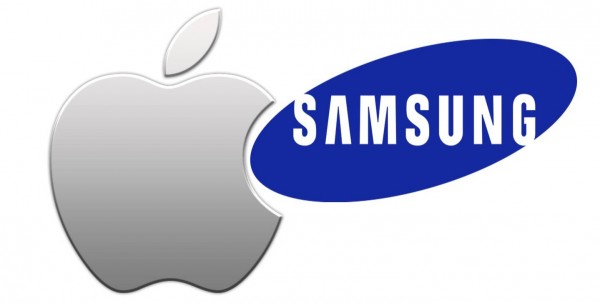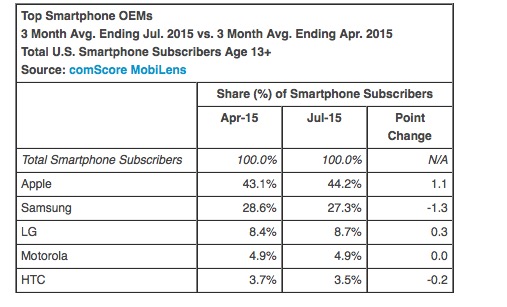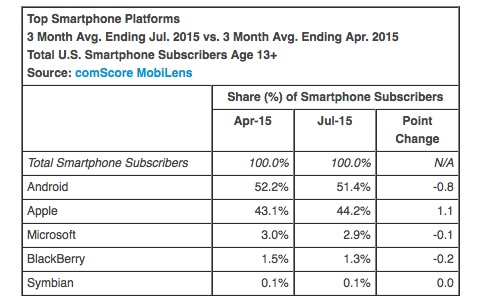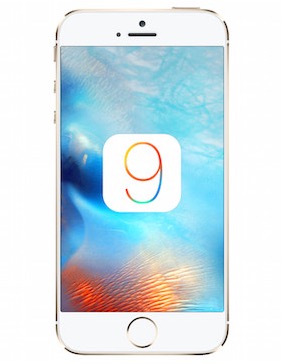Why Apple Won’t Stop Gaining Leads over Samsung in the Race for U.S. Market Dominance

Toggle Dark Mode
Apple and Samsung have been duking it out in the smartphone arena for quite some time. Since iPhone was introduced all the way back in 2007, Samsung has been changing their game to beat out Apple’s world-renown handset. Sadly for Samsung, they’re not winning.
The recent creation of Samsung’s Galaxy S6 and S6 Edge smartphones were sure to give Apple a run-for-their-money. The S6’s design is undoubtedly beautiful, no matter which side of the Android/Apple fence you prefer. With obvious design cues taken from the iPhone 4 (like the S6’s all white glass back panel) we assumed Samsung would start pulling more rank in the United States war for smartphone dominance.
As it turns out, Samsung has actually lost a sizable chunk of market share in just few months. According to the digital analysis company ComScore, within the short time period beginning on April 2015 and ending July 2015, we see market share changes across almost all of the top smartphone manufacturers in the United States.
HTC unsurprisingly lost market share. This has been a quarter after quarter trend due to their stale line of handsets and the mostly unchanged and under improved HTC One lineup. Motorola saw no market share change within those three months, and LG saw a small increase in sales boosting their market share up to 8.7% up from 8.4%. Samsung lost 1.3% market share while Apple gained 1.1%.
This data might say that Samsung owners are jumping ship to Apple smartphones, or even LG’s.
According to CNET, this has been “Samsung’s seventh straight drop in quarterly earnings…” CNET goes on to say that
The company has been hit by tougher competition from Chinese vendors such as Xiaomi and Huawei on the lower end and by Apple on the higher end. One issue is that Samsung’s premium phones continue to sell at a premium price tag. Another is that larger-screened phones are no longer the domain of Android players such as Samsung. Apple joined the big-screen game last year when it unveiled its iPhone 6 and iPhone 6 Plus, with display sizes of 4.7 inches and 5.5 inches, respectively.”
In many cases the Samsung Galaxy S6 is actually more expensive than Apple’s line of handsets, leaving consumers to wonder “why would I pay more money for a lower-end experience?”
The build-quality of Samsung’s smartphones are fantastic, but the problem lies in Samsung’s use of the Android operating system. Yes there are benefits of using Android over iOS like more freedom to customize the phone, and generally fewer limitations.
The positives of Android are diminished when the phone begins to lag, crash, and experience frustrating conflicting software errors. The truth is, iOS is a cleaner smartphone experience with less frustration; and this could be the reason we see iPhone gaining more and more control over the high-end smartphone market.
The idea begins to shift when we take a larger look at the smartphone market as a whole, including the high-end and low-end markets. We see Android continues to reign supreme over Apple with a 51.4% market share compared to Apple’s 44.2%. Android’s availability on less-expensive smartphones puts the operating system in more hands.
It is still interesting to see within the same 3-month period that Android’s popularity has dropped. Microsoft’s operating system and Blackberry’s OS popularity has dropped as well, meaning that literally every major operating system is losing customers to Apple’s iOS.
Apple is undoubtedly becoming a major force in the smartphone market, and for good reason. Amazing quality hardware meets reliable and secure software for an unbeatable experience.
The iPhone 6s will be announced later this month and it is expected that the device will change the way we use our smartphones. The introduction of Force Touch technology within the display is supposed to revolutionize the smartphone experience, much like the Multi-Touch display did on the original iPhone.
Ultimately, Apple plans to make using their devices even quicker and easier-to-use than ever before, something that can’t always be said for Android devices.
If history does in fact repeat itself, it’s safe to say Apple will release their new iPhone in the fall and Samsung will release their newest device in the months that follow. It is also likely that Samsung will “borrow” many of Apple’s innovations, all in effort to steal back some of their slowly-but-surely diminishing customer base.
Why do you think consumers are leaving Android for iOS?
Do you think this trend will continue and why do you believe so?
Let us know in the comments below!






